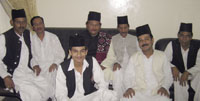
Yemen entranced by Sufi Music [Archives:2007/1080/Last Page]
August 27 2007
 |
Mohammad Ahmed Warsi devotes his life to Sufi music. So have many members of his family for many generations. They perform all over the world. The group, who are based in India where Sufi music is prevalent, came to Sana'a on Friday (and Aden on Saturday) to give Yemenis the opportunity to hear a musical form that is becoming rare. They were invited by the Indian embassy in Sana'a as part of 60th anniversary of Independence celebrations.
Mohammad Warsi's group of seven musicians include four of his brothers, two of his cousins and his son, who one day will take over the leadership from his father.
“It's been in my family over seven generations and I intend to maintain this profession in the family for many more generations to come,” said Warisi.
Qawwali pronounced as Kavali, is form of devotional music of the Islamic mystics also known as Chisti Sufis of the Indian subcontinent. Performers use dhol or tabla (type of drums) harmonica and vocals of different levels. The group which is usually between 6 to 8 members, sits on the ground in two rows and start chanting and using the drums and clapping to regulate the singing pace. Warsi plays the harmonica while he sings passionately, swaying his head every now and then completely overwhelmed with the music and the words.
Staying original
The words are usually poems written centuries ago, probably since the emergence of the art in the 8th century in Persia. It originally used to be performed in Sufi shrines but has expanded to cultural theaters and social gatherings.
Like any other art, Qawwali has gone through transformations to suit modern taste.
The central themes in traditional Qawwali are love, devotion and longing for the divine. The poetry is implicitly understood to be spiritual in its meaning, even though the lyrics can sometimes sound widely secular, or outright hedonistic. An example of this is the Ghazal, which talks about the joys of drinking and the agony of separation from the beloved.
Today there are songs using modern music techniques and rhythm, and in some areas there are female and male groups in which the performance is done like a singing conversation between the men and women. However, Warsi is old school. and does not approve of this.
“.I stick to old poems we heard from our fathers and will try to maintain it this way in my family,” he said.
His son Mohammad Waris Nawaz barely 18, nods his head in agreement and a charming smile. He had been playing the tabla since age five and has made it a full time profession since long ago. Although he managed to go to high school, he is not interested in college like the rest of his siblings.
“I am strongly passionate about Qawwali and hope to fill my fathers shoes when the time comes. I travel with the group around the world and don't feel I am sacrificing anything by taking this line of work,” the young Warisi said. Mohammad Waris is also proud of the fact that his daughter is married to a Qawwali singer from Pakistan.
Keeping it alive
Qawwali is not taught in schools like other forms of Indian arts. Although this Sufi music usually written in Urdu and Panjabi is found in India and Pakistan there is a threat of it fading away. Some of the difficulties according to Warsi are the popularity of modern and international music. Therefore the demand for Qawwali as such is dwindling among the public.
Warsi's group is famous throughout India, therefore the group can afford to perform full time. He also travels the world with his music performing in Europe, Russia, South Africa and the Far East.
He says that non-Urdu speakers can enjoy his performances because in theatres there is often a translation of the lyrics for the audience to read. “Even foreigners relate to Qawwali as they are moved by the music and rhythm,” he said.
A state of trance?!
Listeners, and often artistes themselves are transported to a state of Wajad, a trance-like state where they feel at one with God, generally considered to be the height of spiritual ecstasy in Sufism. The music starts off slowly with soothing rhythm and gradually builds up to an exciting frenzy.
Naseem Urrehman is a UNICEF officer from Pakistan was clearly moved at the Qawwali evening. “It takes you out of your surroundings and overwhelms you with spiritual feelings that I cannot describe,” he said. ” It touched me deeply because I am away from home. But I did not reach a state of trance on Friday because the environment could not allow this. The performers were on the stage far from the audience. Usually the audience surrounds the performers.”
The group is on a tour of Gulf countries, sponsored by Indian Council of Cultural Relations. In Yemen, Arif Ali, an Indian national is the organizer of the local sponsorship for accommodation and local transport from the Indian community in Yemen.
——
[archive-e:1080-v:15-y:2007-d:2007-08-27-p:lastpage]


